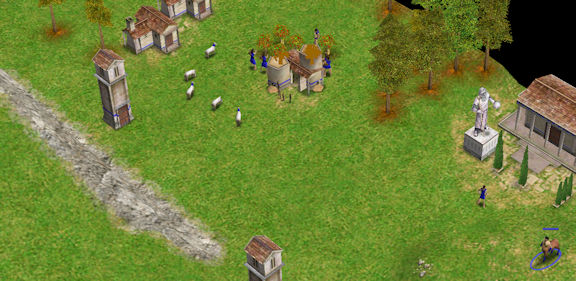All was quiet on the younger-self front. A few weeks had gone by since I took one of my past selves on an imaginary hike near Channelwood Village. I had hoped that she would relax and enjoy the peaceful surroundings for a while. Since then, she had been exceptionally quiet, much more so than I’d anticipated.
To some extent, I had been unfair when I nicknamed her Drama-Queenie because of her volatile temperament. Still, there was a reason for it. Many times, she had unexpectedly popped up from the depths of my subconscious, moaning about mysterious emotional pain. Quiet wasn’t something I associated with her. I concluded that I’d better go check on her and make sure that she wasn’t in—or causing—any trouble.
When I arrived in Channelwood on a bright, crisp morning, I found her returning with a basket of eggs from the village’s new chicken coop. I almost didn’t recognize her. During our recent hike, she had been wearing cheap sneakers and an ugly discount-store sweater and pants. Now she had on a long gingham dress, in keeping with my rather arbitrary decision to set Channelwood’s time period in the year 1897. The ends of her dark braids hung below a neat, clean bonnet. She looked like she had just stepped out of a Little House on the Prairie episode.
(Creative Commons image via flickr)
“Good morning!” I gave her a friendly wave and then fell into step beside her while she carried the eggs to the kitchen outbuilding. Channelwood’s tiny houses in the treetops, all connected by narrow little walkways, did not have their own separate kitchens. Something smelled tasty, and when I turned a corner, I found twelve-year-old Sara toasting thick slices of brown bread on the hearth.
Looking up from the toast, Sara gave me a great beaming smile. “Thank you ever so much for bringing us a wonderful new friend! Ella and I are so happy to have her!”
Sara was known for her good cheer; but, to be honest, this wasn’t the reaction I had been expecting. Given Queenie’s history, I had thought it likely that she would be a sulky and unpleasant guest, tolerated out of pure charity.
“I’m glad to hear that you have been getting along so well with Queenie,” I answered, returning the smile.
Putting down her basket of eggs, the subject of the conversation turned to me and inquired, narrowing her eyes a little, “Why are you calling me Queenie? I’m not any kind of royalty.”
“Oh, I just thought it suited you,” I said breezily, settling myself into a comfortable kitchen chair while Sara spread the toast with apple butter and Ella started frying some eggs.
While Queenie set the breakfast table, I went on talking to her, in a more serious tone. “I’ve been thinking how brave it was of you, being honest about feeling pain. Our culture severely punishes that sort of honesty. It demands that we keep our true feelings to ourselves, hiding the pain behind a happy-face mask so that we don’t make anyone else uncomfortable. If we let the mask slip, other people get nasty, no matter how much we might try to please them and do everything they want—just as you said in the woods during our hike.”
Braids bobbing, Queenie nodded silently as she poured hot cider into thick clay mugs from a large jug that she had picked up from the edge of the hearth.
“I got nasty, too, telling you to shut up because I didn’t want to hear anything more about your pain. And I certainly ought to have known better.” I put a red cloth napkin in my lap as Ella gave me a plate heaped high with eggs and toast.
Queenie finished pouring the cider and sat down to eat her own breakfast. She took a big bite of toast and chewed slowly, thinking over her words before she answered.
“I know this isn’t a real place,” she began, “and that means I’ll have to go back to my old life, always falling short of everyone’s expectations because I’m not perfect, no matter what I do. But I wish I could stay here forever. To me, it feels much more real here. When I go out to the chicken coop to get the eggs, I don’t have to pretend anything. I’m not expected to compete every day to be a great success, never show any weakness, and keep everyone around me happy at all times.”
“That’s fair,” I said, as the steam rose from my cider on the table between us. “And the way I see it, there’s no requirement for you to go back. This is not a dream from which you have to wake up; it’s more like an alternate timeline. In the so-called real world, other versions of you checked off those modern-adult-life boxes many years ago—and they did a reasonably good job. It’s done and taken care of.”
After sitting motionless for several seconds with a look of total amazement, Queenie suddenly started bawling all over her breakfast. Big fat tears rolled down her cheeks and splattered all over her fried eggs.
Ella, who had been just about to sit down to her own meal, gave Queenie an alarmed glance and remained standing next to her.
“It’s all right,” Queenie gulped, managing to get a few words out. “I’m c-crying because I’m huh-huh-happy.”
“Well, of course you’re happy! Why shouldn’t you be?” Sara declared. “Everyone ought to be able to live someplace where she’s happy!”
Although Ella finally sat down, she kept a suspicious gaze fixed on me, as if she thought I might change my mind at any moment and snatch Queenie away. I didn’t take her distrust too personally because, after all, writers have to get used to characters who decide they’ve had enough of plot changes. Besides, I had a different kind of surprise in mind.
“Because you were so brave, Queenie, I think you deserve a medal.” I reached into my pocket and held out my hand toward her. A brightly polished gold circle glinted on my palm, with the word ‘Courage’ in elegant script above a raised image of a crown.
Looking down at the table and blushing, Queenie muttered, “But, but I wasn’t, not really…”
“Yes, you were,” I assured her. “Sometimes we can be at our very bravest when we see ourselves as not doing much of anything. It takes great courage to go against society’s demands and to say instead—this is wrong, this is hurtful. You had that courage, and it’s only fair that you should be recognized for it.”
The medal was attached to a braided gold chain, which I fastened around Queenie’s slender neck. Then I finished my eggs and toast (which were delicious) and thanked the girls for their hospitality. As I returned to what I called real life, I couldn’t help but to wonder just how much more real it was anyway.










